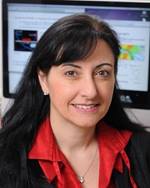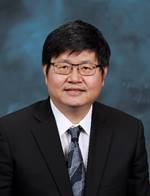Ceremony and Lecture Series
NOTICE: Nominations for the 2024 Distinguished Scientist Fellows Opportunity closed 5:00 PM ET, Monday, December 11, 2023. Selection announcements and lecture information will be published on this page once available.
October 26, 2022: The Department of Energy (DOE) announced two National Laboratory scientists as the 2022 DOE Office of Science Distinguished Scientist Fellows: Dr. Marcela Carena of Fermi National Accelerator Laboratory and Dr. Sheng Dai of Oak Ridge National Laboratory. In honor of their selection, the Office of Science hosted a two-part lecture series featuring the 2022 Distinguished Scientist Fellows. Recordings of the lectures are linked below. Proceedings included an award ceremony, technical talk covering the Fellows’ science and career, and a Q&A session. Fellows discussed their research accomplishments, career trajectories, and experiences working at the DOE National Laboratories.
 Dr. Marcela Carena - Fermi National Accelerator Laboratory
Dr. Marcela Carena - Fermi National Accelerator Laboratory
Lecture and ceremony were held on January 25, 2023.
A recording of the lecture is online.
Photos from the event are available online.
Honored “for leadership and influential contributions to particle physics, including novel theoretical ideas and strategies for HEP experiments related to the Higgs boson, dark matter and electroweak baryogenesis, and promoting Latin American participation in DOE-hosted experiments.”
 Dr. Sheng Dai - Oak Ridge National Laboratory
Dr. Sheng Dai - Oak Ridge National Laboratory
Ceremony and lecture were held on November 9, 2022.
Photos from the event are available online.
A recording of the lecture is online.
Honored “for pioneering advances in development of functional materials for separation science, energy storage, catalysis, and other energy-related applications and for excellence in leading team science and mentoring the next generation of researchers.”
The Distinguished Scientist Fellows award, authorized by the America COMPETES Act, is bestowed on DOE National Laboratory scientists with outstanding records of achievement and provides each Fellow with $1 million in direct funding to support activities that develop, sustain, and promote scientific and academic excellence in DOE Office of Science research.
The 2022 DOE Office of Science Distinguished Scientist Fellows are:
Dr. Marcela Carena - Fermi National Accelerator Laboratory
Honored “For leadership and influential contributions to particle physics, including novel theoretical ideas and strategies for HEP experiments related to the Higgs boson, dark matter and electroweak baryogenesis, and promoting Latin American participation in DOE-hosted experiments.”
Marcela Carena is a theoretical physicist and head of the Theory Division at the Fermi National Accelerator Laboratory and Professor of Physics at the University of Chicago, where she is a member of the Enrico Fermi Institute and the Kavli Institute for Cosmological Physics. Her research explores the possible connections between the Higgs boson, dark matter, and the origin of matter in the early universe. She has been a leader in exploring radical new concepts such as supersymmetry and warped extra dimensions and proposing mechanisms for baryogenesis, with emphasis on showing how these ideas can be tested in experiments. Recently, she also works at the boundary between particle physics and quantum information to tackle problems of quantum theory and the early universe. Carena did her undergraduate studies at the Balseiro Institute in Argentina and her PhD in physics at the University of Hamburg, Germany; she held positions at Purdue University, the Max-Planck Institute in Munich and the CERN laboratory, before moving to Chicago.
Carena is former chair of the Division of Particles and Fields of the American Physical Society (APS). She is an APS Fellow and a former APS General Councilor and Executive Board member. She is a Fellow of the American Association for the Advancement of Science and the Academia Nacional de Ciencias Exactas, Físicas y Naturales of Argentina. She served on the U.S. DOE/NSF High Energy Physics Advisory Panel and on several international scientific advisory panels around the world. Currently, she serves on the National Academy of Sciences EPP2024 committee, the advisory board of the Serrapilheira Institute in Brazil, and chairs the advisory board of the Perimeter Institute in Canada. In 2021, Carena won the Raíces Prize for Distinguished Scientists abroad from the Argentinian Ministry for Innovation, Science and Technology. In 2010, she won the Research Award from the Alexander von Humboldt Foundation. Carena has published over 160 peered-review articles with a total of more than 62,000 citations, and delivered over 350 presentations, colloquia, and public lectures around the world. Through her research she is committed to support and enable the next generation of diverse leaders in physics.
Dr. Sheng Dai - Oak Ridge National Laboratory
Honored “For pioneering advances in development of functional materials for separation science, energy storage, catalysis, and other energy-related applications and for excellence in leading team science and mentoring the next generation of researchers.”
Dr. Sheng Dai obtained both his B.S. (1984) and M.S. degrees (1986) in Inorganic Chemistry at Zhejiang University and his Ph.D. (1990) in Chemistry at the University of Tennessee. Currently, he is a Corporate Fellow and Section Head overseeing four research groups in the areas of separations and polymer chemistry at Oak Ridge National Laboratory (ORNL) and is also a Professor of Chemistry at the University of Tennessee, Knoxville (UTK). His current research interests include ionic liquids, porous materials, and their applications for separation sciences and energy storage as well as catalysis by nanomaterials. His research has garnered the 2020 Max Bredig Award for Ionic Liquids and Molten Salts, the 2019 ACS Award in Separation Science and Technology, and 2018 IMMA Award given by the International Mesostructured Materials Association. He is a Fellow of the Material Research Society and the American Association for the Advancement of Science.

